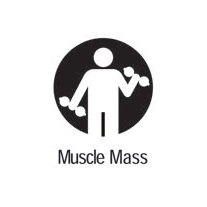
The predicted weight of muscle in your body.
Muscle mass includes the skeletal muscles, smooth muscles such as cardiac and digestive muscles and the water contained in these muscles. Muscles act as an engine in consuming energy.
As your muscle mass increases, the rate at which you burn energy (calories) increases which accelerates your basal metabolic rate (BMR) and helps you reduce excess body fat levels and lose weight in a healthy way.
A high level of muscle mass can reduce the risk developing diabetes in adulthood. More skeletal muscle means more insulin receptor sites, which help with the uptake and regulation of glucose (sugar) deposited in the bloodstream after eating. 80% of glucose uptake occurs in skeletal muscle so the more there is, the easier it is for the body to regulate insulin levels and minimise excess fat.
In the elderly, muscle mass is particularly important for maintaining mobility, supporting the joints and in maintaining good balance, thereby helping to minimise the risk of falls and fractures. A good or high level of muscle mass is also fast becoming recognised as a key indicator for longevity. Muscle tissue naturally declines with age. A person can lose up to 50% of their muscle mass between the ages of 20 and 90 – another reason why it is important to keep muscle mass levels within the healthy range at every life stage.
